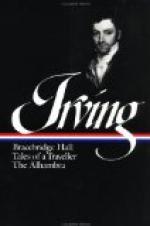We were fortunate enough to enter in time for a glee composed by him expressly for the club, and which he sang with two boon companions, who would have been worthy subjects for Hogarth’s pencil. As they were each provided with a written copy, I was enabled to procure the reading of it.
Merrily, merrily push round the glass,
And merrily troll the glee,
For he who won’t drink till he wink
is an ass,
So neighbor I drink to thee.
Merrily, merrily puddle thy nose,
Until it right rosy shall be;
For a jolly red nose, I speak under the
rose,
Is a sign of good company.
We waited until the party broke up, and no one but the wit remained. He sat at the table with his legs stretched under it, and wide apart; his hands in his breeches pockets; his head drooped upon his breast; and gazing with lack-lustre countenance on an empty tankard. His gayety was gone, his fire completely quenched.
My companion approached and startled him from his fit of brown study, introducing himself on the strength of their having dined together at the booksellers’.
“By the way,” said he, “it seems to me I have seen you before; your face is surely the face of an old acquaintance, though for the life of me I cannot tell where I have known you.”
“Very likely,” said he with a smile; “many of my old friends have forgotten me. Though, to tell the truth, my memory in this instance is as bad as your own. If, however, it will assist your recollection in any way, my name is Thomas Dribble, at your service.”
“What, Tom Dribble, who was at old Birchell’s school in Warwickshire?”
“The same,” said the other, coolly.
“Why, then we are old schoolmates, though it’s no wonder you don’t recollect me. I was your junior by several years; don’t you recollect little Jack Buckthorne?”
Here then ensued a scene of school-fellow recognition; and a world of talk about old school times and school pranks. Mr. Dribble ended by observing, with a heavy sigh, “that times were sadly changed since those days.”
“Faith, Mr. Dribble,” said I, “you seem quite a different man here from what you were at dinner. I had no idea that you had so much stuff in you. There you were all silence; but here you absolutely keep the table in a roar.”
“Ah, my dear sir,” replied he, with a shake of the head and a shrug of the shoulder, “I’m a mere glow-worm. I never shine by daylight. Besides, it’s a hard thing for a poor devil of an author to shine at the table of a rich bookseller. Who do you think would laugh at any thing I could say, when I had some of the current wits of the day about me? But here, though a poor devil, I am among still poorer devils than myself; men who look up to me as a man of letters and a bel esprit, and all my jokes pass as sterling gold from the mint.”
“You surely do yourself injustice, sir,” said I; “I have certainly heard more good things from you this evening than from any of those beaux esprits by whom you appear to have been so daunted.”




